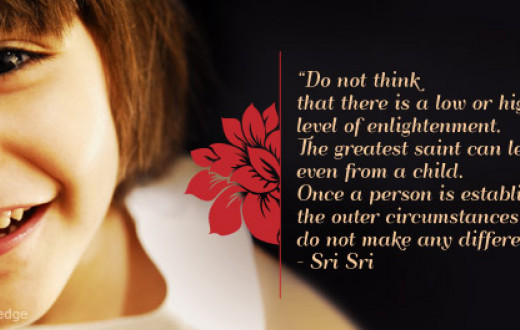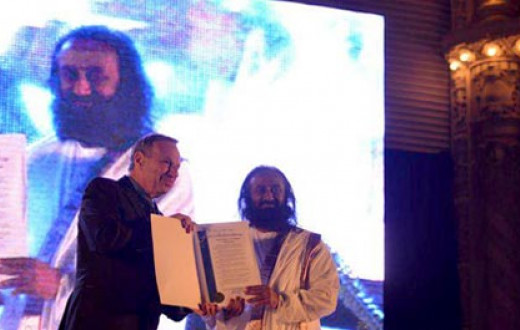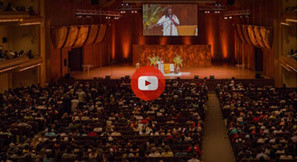Bangalore, India

In the seventh chapter of the Bhagavad Gita, Lord Krishna begins by saying, ‘Maiyy asakta-manah Partha yogam yunjan mad-ashrayah. Asamsayam samagram mam yatha jnasyasi tach-chrnu.’ (7.1)
He says, ‘By keeping all your affection on Me, and practicing the path of Yoga as described by Me, I shall now explain to you how you can know Me completely’.
Here, aasakti means affection, and ashraya means that which we depend on. There is affection (aasakti) towards those who we love, and there are those whom we depend (ashraya) on. And that which we stay connected to is called Yoga.
So here, Lord Krishna includes everything. Your heart and your mind, both are engaged.
Doubt means that your Prana has not blossomed fully; it has not reached its peak. The Prana has gotten stuck somewhere in the body. When you are full of Prana, all doubts automatically disappear. That is why when you are very happy, there are no doubts in your mind. When you are deeply in love, no doubts arise in you.
For example, your job is different from your hobby. There is aasakti (meaning desire or affection) towards your hobby, but you do your job because you have to. So, doing your job regardless of what may be, is Karma Yoga (the path of performing one’s duty). While we do our job because we have to, our affection is somewhere else, or towards something else.
So here, Lord Krishna begins by saying, ‘One who has his total affection on me, who is dependent on me, who is constantly devoted towards uniting with Me through the practice of Yoga (as described by the Lord Himself), and who is free from doubts; how such a person can know Me and My true form completely, I will now explain that to you’.
Lord Krishna told Arjuna many times, ‘Just focus on Me alone, and not here and there’. Why did he say this so many times? It is because Arjuna was so dejected and troubled by his doubts.
Only one whose doubts have disappeared can attain knowledge.
Usually we think it is the other way around. One who receives knowledge is relieved from all his doubts. Here, there are two things.
First, one who gains the knowledge is relieved from all doubts – this applies to the material world; it is limited.
The other is, one who is freed from doubts; meaning one whose Prana (subtle life force or energy) is very high, becomes capable of understanding knowledge at a deeper level. Such a person is one who truly knows.
We often think that our doubts can be resolved by questions and answers, isn’t it? But it is actually not so. Answering one question leads to ten other questions in the mind. One pair of question and answer gives rise to ten other new questions, and then this chain of questions and answers continues endlessly, but the doubt does not go away.
The very reason we ask questions is to clear our doubts. But here, Lord Krishna is saying that only one who is freed from all doubts is capable of knowing (the truth).
Doubt means that your Prana has not blossomed fully; it has not reached its peak. The Prana has gotten stuck somewhere in the body.
When you are full of Prana, all doubts automatically disappear. That is why when you are very happy, there are no doubts in your mind. When you are deeply in love, no doubts arise in you.
Doubt means that you partially believe something, and you partially disbelieve it also. If you disbelieve something completely, then there is no doubt, and if you believe something completely, then too you will not have any doubt at all. So a doubt arises when you both believe and disbelieve something.
Now, how can one be free of all doubts and know something completely? This is what Lord Krishna talks about.
‘Jnanam te'ham sa-vijnanam idam vaksyamy asesatah. Yaj jnatva neha bhuyo 'nyaj jnatavyam avasisyate’. (7.2)
He says, ‘This is very deep knowledge (jnana), but there is a science (vigyana) to it also. This is what I shall tell you now, after knowing which nothing more remains to be known’.
Lord Krishna says, ‘There is nothing that I will keep from you. I am giving you the complete knowledge’.
He does not say that I will tell you one part of this knowledge today and the remaining part tomorrow. Usually music teachers and maestros do this. They give the knowledge part by part, in a very miserly manner. They will teach you two lines of a song and will ask you to practice it and come the next day. Then they will teach you another two lines and make you repeat the practice.
They will teach the Pallavi (the main thematic line of a song in Carnatic music) part of the song on one day, and the Anupallavi (the short version of the main line) the next day. So they do not teach the student fully. They keep testing the student many times before giving the complete knowledge. But here, Lord Krishna does not test Arjuna because He already knows everything (about Arjuna); so there is no need to test.
Anyways, Arjuna is already depressed, so what is the use of testing him further. So He tells him, ‘Do not worry. I will tell you everything and leave nothing out for you to know’. And He says that this knowledge is so vast that after knowing this, nothing more remains to be known further.
When a student is told that he is going to be given very deep knowledge, then he becomes alert. Just by hearing this, he stands in attention, and his hairs stand on end with anticipation. Then he listens carefully with full attention. That is why Lord Krishna adds this line before going further.
Many times people come to me and say, ‘Gurudev, I want to get rid of my ego’. What is it that you want to get rid of? Ego too is a form of God, so just let it be there. The ego seated deep within you is also a form of the Divinity.
If someone tells us something casually, most of the time, we do not even listen to them attentively. But if they tell you, ‘Come here! I have a secret to tell you’, then you instantly respond by saying, ‘Yes, yes! What is it? Tell me’.
You become fully attentive in that moment. Does this happen to you or not?
It may be a very ordinary thing they may want to tell you, but before that if they say, ‘Listen! I have a secret I want to tell you. It is very urgent’, then you become very alert and attentive, and are completely ready to listen.
So in the same way, here the Guru (Lord Krishna) is preparing the disciple (Arjuna) to listen to Him attentively. Otherwise the Guru keeps on speaking and the disciples go off to sleep. This is what usually happens.
Many times, we go to a session to listen to deep knowledge, but we come back saying, ‘Oh! The knowledge was so high that I could not understand anything. It all went above my head’. Do you know why this happens? It is because we simply do not listen. Our mind is so full of worries all the time; either our own or that of others around us. We are not able to live without worrying. And if there are no problems, then we create problems for ourselves. We find a thousand reasons to get worried.
In the next verse, He says, ‘Manusyanam sahasresu kascid yatati siddhaye. Yatatam api siddhanam kascin mam vetti tattvatah’. (7.3)
Out of millions of people, very few will walk the spiritual path and make efforts to gain knowledge of the truth. Very few will follow the path of Yoga.
In those days too, the state of spirituality was the same.
Mahabharata happened then, and even today it is happening. Only earlier it took place on the battlefield of Kurukshetra, and today it is happening in our parliament.
Delhi is just a 100 km away from Kurukshetra anyway. The only difference today is that the Gita is not being recited there.
If you observe, there is a Kurukshetra happening in every house today (referring to a state of moral conflict).
So Lord Krishna says that out of millions of people, very few will walk the spiritual path, and of those few who follow the spiritual path, fewer still are able to realize Me and know Me completely by my true form (Tattva).
The rest of the people come, just listen and go away without grasping anything. Only a few rare people are actually able to know Me by My true nature (Tattva-jnana: here meaning knowledge of the deepest principle or element).
This is a great secret. And what is the Tattva that He is speaking about here? He explains this in the fourth verse: ‘Bhumir apo 'nalo vayuh kham mano buddhir eva cha. Ahamkara itiyam me bhinna prakrtir ashtadha’. (7.4)
He says, ‘Do you think I am only this physical body? No! I am Earth, I am Water, I am Fire, I am Air and I am Space. I am the Mind, Intellect and the Ego. These are the eight types of energies, that is me, and I call these my Apara-prakruti (eight types of nature or modes of expression of the Divine in the materialistic realm). I am all eight of these. I am present in every particle of this Earth, and in every molecule of water.
Water is present everywhere – in the Earth, in the sky, in the air and in the sea; it is everywhere.
Do you know, 60% of your body is composed of water? So all these people sitting here today are nothing but many litres of water (laughter).
If you weigh 60 kg, then nearly 36 kg of your body weight is nothing but water. So each person is like an earthen pot, filled with water. Similarly, 15% of your body is made up of the air element. Your body also has the earth element and all these are bound together by the fire element, and that is where body heat comes from. So there is heat in the body due to the fire element.
Then, Lord Krishna also says, ‘I am the mind, intellect and the ego’.
Many times people come to me and say, ‘Gurudev, I want to get rid of my ego’.
What is it that you want to get rid of? Ego too is a form of God, so just let it be there. The ego seated deep within you is also a form of the Divinity.
He says, ‘All these eight types of nature are present within you, and they are all nothing but different forms of Me’, this is what Lord Krishna says to Arjuna. You are not your mind. You are not your intellect. You are not your ego. So what remains then?
In the next verse He says: ‘Apareyam itas tva anyam prakrtim viddhi me param. Jiva-bhutam maha-baho yayedam dharyate jagat’. (7.5)
Besides these eight types of nature which are collectively called the Apara-prakruti (Apara means that which is related to the material world), there is another Prakruti (energy) which is much higher, called the Para-prakruti. Everything in creation is upheld by this Para-prakruti.
That which has taken all the form that you see in the world; that which is the cause of all that is happening in the world, the reason behind the Sun shining and the Moon rotating is the Para-prakruti. It is the primary cause behind all that is happening in the material creation.
So Lord Krishna says to Arjuna, ‘In the absence of the which, no living creature or human being, neither the Earth, the Universe nor this entire creation can exist; that Tattva, i.e., the Para-prakruti is me. That which cannot be seen, yet it is, and is the basis of everything that exists, that Para-prakruti is me, and this is what you should know’.
All this empty space that you see here, is not actually empty. It is full of energy which is called Dark Energy and Dark Matter. It is said, ‘That which is unseen is true’. This is because all that you can see, is a very small part of what actual is. All the stars and planets that you see in the sky are very small compared to the invisible energy in the empty space around them, which is much more powerful than the stars themselves.
The entire creation rests upon this Para-prakruti, which scientists today call the Dark Matter and Dark Energy.
Scientists today say that the Sun is round like a sphere only because there is tremendous amounts of pressure of energy from all sides. And the energy in this empty space around the Sun is much more powerful than the Sun itself. It is just like how you see a bubble inside a bottle of water. Why is the bubble round in shape? It is because the water around it is exerting pressure from all sides.
That is why, any object that appear round in shape, is only because of the pressure of the energy present in the empty space (which is unseen) around the object, and which is a thousand times more powerful than the object itself.
All this empty space that you see here, is not actually empty. It is full of energy which is called Dark Energy and Dark Matter.
It is said, ‘That which is unseen is true’. This is because all that you can see, is a very small part of what actually is.
All the stars and planets that you see in the sky are very small compared to the invisible energy in the empty space around them, which is much more powerful than the stars themselves. So this is what scientists today have spoken about, and the same thing was told by Lord Krishna.
He says, ‘I am that Para-prakruti that holds the entire creation, and which this creation rests upon’.
So Lord Krishna is that Dark Energy that scientists today refer to. The word Krishna also means dark in colour.
That which cannot be seen is the basis of everything, and that which we can see is actually nothing! (Laughter)
Whatever we can see – the trees, the flowers – are a very small part of what is. It is the manifestation of the Apara-prakruti. But this Apara-prakruti is contained within the Para-prakruti that cannot be seen. So Lord Krishna says both these things.
For example, you cannot see the consciousness that is present within you. But you can perceive the projection of your consciousness in the form of your mind, intellect and the ego. Isn’t it?
So this is what Lord Krishna means when He speaks of Tattva-jnana: (knowing the creation in terms of its underlying principle or Tattva, i.e., the Divinity).
The speciality of Indian spirituality is that it has never dismissed science. In fact science has always been given equal importance in Indian spirituality.
This is why it is said, ‘Tattva-jnana’, first understand this creation as the manifestation of the five elements – Earth, Water, Fire, Air and Space. By understanding this knowledge (Apara-prakruti), you can then understand the higher knowledge of the Para-prakruti. This is what Tattava-jnana is.
Even God has been identified as a Tattva or a fundamental principle. That is why Indian spirituality is a combination of spiritual knowledge and scientific principles.
(Click Here to Continue Reading.)
(Note: The discourse was given in Hindi. Above is a translation of the orginal talk.)














































